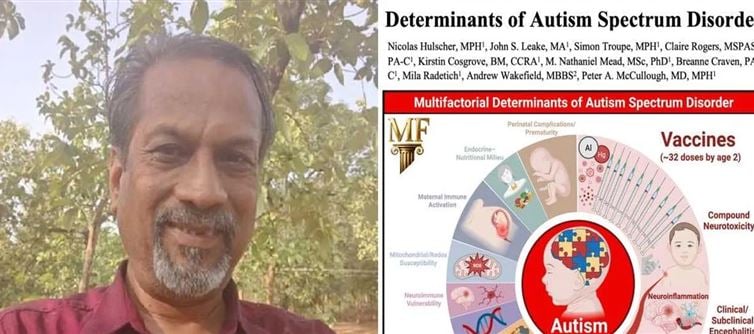
⚡When Influence Turns Irresponsible
Zoho founder Sridhar Vembu, often celebrated as the face of India’s homegrown tech revolution, has walked straight into a minefield — not of business, but of science. His recent remarks linking childhood vaccines to autism have drawn severe backlash from medical experts across the globe, who accuse him of spreading misinformation under the guise of curiosity.
In a single tweet, the billionaire technologist shifted from being a symbol of innovation and intellect to a cautionary tale of how influence, when misused, can distort public understanding of science.
Because when someone with millions of followers questions vaccines, it’s not just a debate — it’s a potential public health hazard.
💉 The Tweet That Started It All
It began when Vembu cited a controversial study authored by Peter McCullough and Andrew Wakefield — both widely discredited in medical circles for peddling anti-vaccine narratives.
In his post, Vembu wrote:
“Parents should take this analysis seriously. I believe there is increasing evidence that we are giving way too many vaccines to very young children. This is spreading in india too and we are seeing a rapid increase in autism in India.”
The statement was quick to ignite outrage. Wakefield’s infamous 1998 Lancet paper claiming a link between the MMR vaccine and autism was long ago retracted and debunked as fraudulent science — yet here was one of India’s most celebrated entrepreneurs reviving that ghost in 2025.
🔥 ‘Utterly Irresponsible’: The Medical World Reacts
The backlash was swift and scathing.
Doctors, scientists, and public health experts called Vembu’s comments “utterly irresponsible”, warning that such statements could erode public trust in vaccines and trigger preventable disease outbreaks.
Dr. amit Gupta, Clinical Lead for Neonatal Care at Oxford’s john Radcliffe Hospital, minced no words:
“This is utterly irresponsible. Luckily people don’t listen to folk like you, otherwise we’d have an infectious disease crisis on our hands.”
But instead of backing down, Vembu doubled down — questioning the doctor’s expertise and accusing him of “professional arrogance.”
The exchange only deepened the rift between scientific consensus and tech-fueled speculation.
🧠 Tech Genius, Medical Novice
Here’s where it gets dangerous.
Vembu is no crank on the internet — he’s a billionaire founder of one of India’s most respected tech companies. His words carry enormous weight among followers who idolize him as a visionary.
When such a figure flirts with pseudoscience, it normalizes skepticism of proven medical facts.
This isn’t curiosity — it’s reckless amplification.
Because no matter how brilliant one might be in code or corporate strategy, that brilliance does not transfer into epidemiology.
Vaccines are the backbone of modern public health. Questioning them based on unverified studies risks undoing decades of medical progress — and potentially, lives.
⚠️ ‘You Don’t Want Measles to Kill Your Child’
Doctors across india and abroad issued urgent appeals urging parents not to take Vembu’s claims seriously.
Dr. Cyriac Abby Philips, widely known as The Liver Doc, fired back:
“Please do not stop vaccinating your children. You don’t want polio to come back. You don’t want measles to kill your child like it is doing in the US because anti-science voices have taken charge.”
He also tore apart the study Vembu quoted, calling it non-peer-reviewed, anti-vax funded, and scientifically worthless.
Others, like psychiatrist Dr. Siva Anoop Yella, criticized Vembu for “quoting one questionable study” and noted sarcastically that “no wonder Arattai isn’t clicking much in India.”
The consensus among experts was crystal clear — Vembu’s comment wasn’t just wrong; it was dangerously misleading.
🧩 The Autism-Vaccine Myth: A Zombie lie That Won’t Die
The supposed vaccine-autism link has been debunked repeatedly by large-scale studies worldwide.
The World health Organization (WHO), CDC, and every credible medical body have affirmed there’s no causal relationship between childhood vaccination and autism spectrum disorder.
And yet, the myth refuses to die — kept alive by misinformation, selective reading of data, and influential voices who amplify fringe studies without context.
Vembu’s tweet adds another brick to this dangerous wall of distrust, giving oxygen to anti-vax movements in a country still fighting to maintain high immunization rates.
💣 The Cost of Reckless Speech
When someone of sridhar Vembu’s stature speaks, people listen.
That’s precisely why his words carry responsibility, not just reach.
In a world already drowning in misinformation, the last thing india needs is another influential figure questioning the science that saves millions of children every year.
Because words like these can do real harm — they can make a hesitant parent skip a crucial shot, and one skipped shot can mean an outbreak.
That’s not curiosity. That’s collateral damage.
⚖️ The Verdict: Leadership Demands Literacy
sridhar Vembu’s intellect is beyond dispute. But this episode underscores a painful truth: expertise in technology does not equal authority in science.
Influence is a powerful tool — one that demands discipline, humility, and a responsibility to verify before you voice.
The world needs curious thinkers, yes — but not reckless influencers who treat public health like a twitter thought experiment.
When you build software, mistakes lead to bugs.
When you spread misinformation, mistakes lead to suffering.
🧾 Disclaimer
This article is based on publicly available posts and verified statements shared by medical professionals and social media users.
The opinions expressed here reflect the public and expert responses to sridhar Vembu’s comments.
All medical claims regarding vaccines and autism have been thoroughly disproven by the global scientific community.
Readers are urged to follow credible, peer-reviewed scientific sources and consult licensed healthcare professionals for guidance on vaccination and public health.




 click and follow Indiaherald WhatsApp channel
click and follow Indiaherald WhatsApp channel